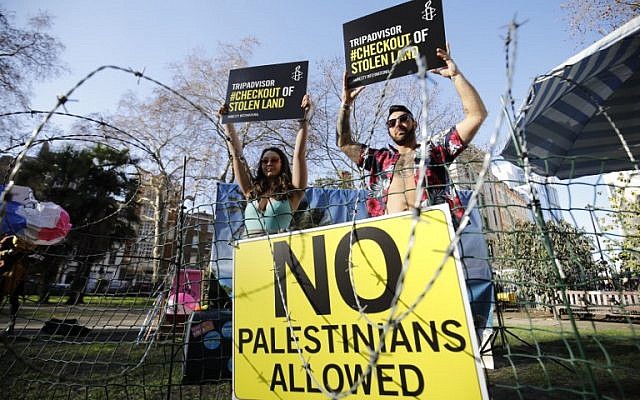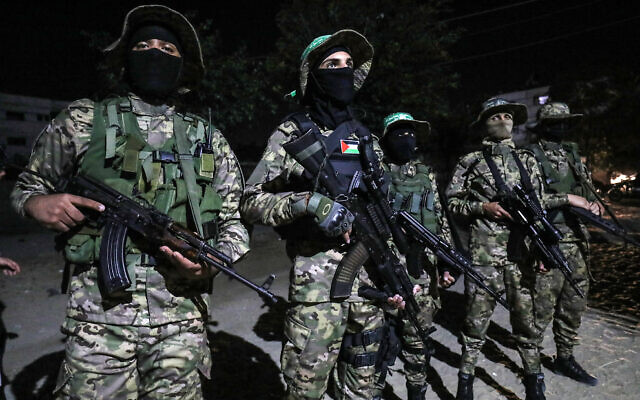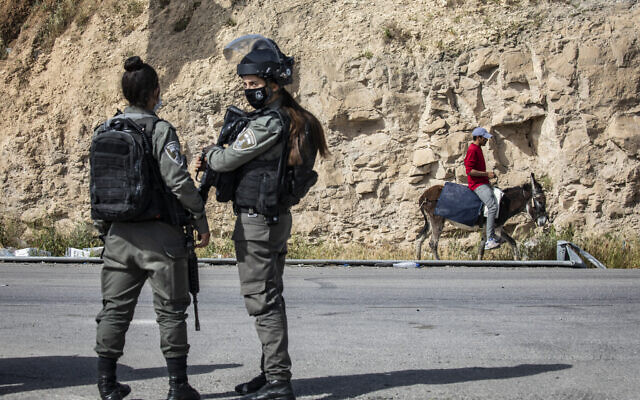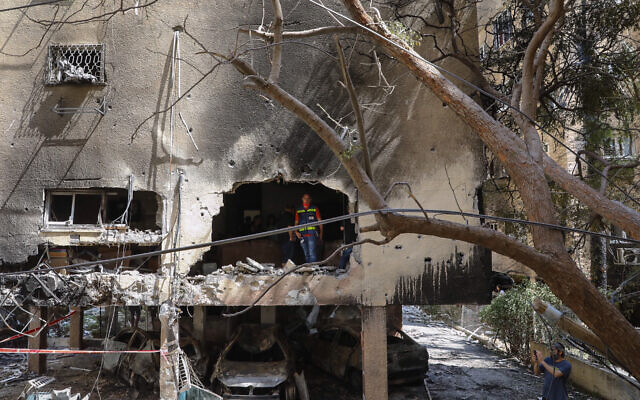- Rights group does not compare Israel to S. Africa, but evaluates policies based on int’l conventions; urges ban on arms sales; says ‘Palestinians treated as inferior racial group’
Amnesty International said Tuesday that Israel has maintained “a system of oppression and domination” over the Palestinians going all the way back to its establishment in 1948, one that meets the international definition of apartheid.
The accusation was leveled against Israel both within its borders and in the West Bank and Gaza Strip. However, the group did not compare Israel to apartheid South Africa, instead evaluating Israel’s policies based on international conventions.
Ahead of the report’s release, Israel called it “false, biased, and antisemitic” and accused the organization of endangering the safety of Jews around the world. The rights group released the document despite calls from Israel to not to do so.
“The USA, the European Union and its member states and the UK, but also those states that are in the process of strengthening their ties – such as some Arab and African states… must recognize that Israel is committing the crime of apartheid and other international crimes,” read the report.
Amnesty called on those actors to “use all political and diplomatic tools to ensure Israeli authorities implement the recommendations outlined in this report and review any cooperation and activities with Israel to ensure that these do not contribute to maintaining the system of apartheid.”  Illustrative: Israeli soldiers inspect cars at a checkpoint near the West Bank city of Nablus on January 10, 2018. (Jaafar/Ashtiyeh/AFP)
Illustrative: Israeli soldiers inspect cars at a checkpoint near the West Bank city of Nablus on January 10, 2018. (Jaafar/Ashtiyeh/AFP)
Amnesty International also said that the global community must stop supplying Israel with weapons and military assistance.
“Finally, it is calling on states to institute and enforce a ban on products from Israeli settlements,” the report read.
Amnesty’s Secretary General Agnes Callamard said in a statement released on Tuesday that Israel racially discriminated against Palestinians. She rejected accusations of bias leveled against the organization.
“Whether they live in Gaza, East Jerusalem and the rest of the West Bank, or Israel itself, Palestinians are treated as an inferior racial group and systematically deprived of their rights,” Callamard said. “Israel’s cruel policies of segregation, dispossession and exclusion across all territories under its control clearly amount to apartheid.” Rights group Amnesty stages a demonstration outside the UK headquarters of US travel company TripAdvisor in London on January 30, 2019. (Photo by Tolga AKMEN / AFP)
Rights group Amnesty stages a demonstration outside the UK headquarters of US travel company TripAdvisor in London on January 30, 2019. (Photo by Tolga AKMEN / AFP)
“The reaction of the Israeli authorities is in keeping with their reactions to similar reports, and in keeping with their reaction to any allegations that Israel is committing any human rights allegations,” she said.
“We were not surprised and we were prepared,” Callamard said, accusing the Foreign Ministry of breaking the embargo on the report, which was set for release on Tuesday morning.
“We recognize the right of the Jewish people to self-determination,” she insisted. “We recognize the existence of the Jewish state of Israel.”
With the release of the 278-page report, compiled over a period of four years, the London-based group joins other rights groups in making the accusation against Israel — both within its borders and in the West Bank and Gaza Strip.
Israel rejects any allegation of apartheid, saying its own Arab citizens enjoy equal rights. Israel also notes that it granted limited autonomy to the Palestinian Authority at the height of the peace process in the 1990s and withdrew its soldiers and settlers from Gaza in 2005.
The groups point to what they say are discriminatory policies within Israel and in East Jerusalem, and Israel’s blockade of the Gaza Strip, which has been ruled by the Hamas terror group since 2007. Israel says the blockade is necessary to prevent terror groups dedicated to its destruction from arming themselves in order to attack. Fighters in Hamas’s military wing take part in a memorial service for a member of the Islamist terror group, in the southern Gaza city of Rafah, November 15, 2021. (Abed Rahim Khatib/Flash90)
Fighters in Hamas’s military wing take part in a memorial service for a member of the Islamist terror group, in the southern Gaza city of Rafah, November 15, 2021. (Abed Rahim Khatib/Flash90)
The groups also point to what they say is Israel’s de facto annexation of the West Bank, where it maintains military rule, exerting overall control in most of the territory while actively building and expanding Jewish settlements that most of the international community considers illegal.
Palestinians have accused Israel of apartheid for decades, and Palestinian Authority President Mahmoud Abbas leveled the charge last September in a fiery UN speech.
In its report, Amnesty traces such policies back to the establishment of Israel in 1948. Around 700,000 Palestinians fled or were expelled during the war surrounding Israel’s declaration of independence, when neighboring Arab countries invaded, vowing to wipe the nascent Jewish state off the map. They accounted for some 80% of the Palestinian population at the time in what is now Israel.
Today, Arabs inside Israel have citizenship, including the right to vote, and some have reached the upper echelons of politics, business, law, medicine and entertainment. But overall, they still face discrimination in areas like the job and housing markets.
“Since its establishment in 1948, Israel has pursued a policy of establishing and maintaining a Jewish demographic hegemony and maximizing its control over land to benefit Jewish Israelis while restricting the rights of Palestinians and preventing Palestinian refugees from returning to their homes,” Amnesty said. “Israel extended this policy to the West Bank and Gaza Strip, which it has occupied ever since.” Illustrative: Border Police officers stand guard on a West Bank checkpoint on April 22, 2020. (Olivier Fitoussi/FLASH90)
Illustrative: Border Police officers stand guard on a West Bank checkpoint on April 22, 2020. (Olivier Fitoussi/FLASH90)
While Israel dismissed previous reports as biased, it has adopted a far more adversarial stance toward Amnesty, accusing it of antisemitism and of delegitimization of Israel’s very existence even before the report was published.
“Its extremist language and distortion of historical context were designed to demonize Israel and pour fuel onto the fire of antisemitism,” the Foreign Ministry said.
Foreign Minister Yair Lapid said Amnesty was echoing “the same lies shared by terrorist organizations.”
“Israel isn’t perfect, but we are a democracy committed to international law, open to criticism, with a free press and a strong and independent judicial system,” he said in a statement Monday.
None of the reports compared Israel to apartheid South Africa, where a system based on white supremacy and racial segregation was in place from 1948 until 1994. Instead, they evaluated Israel’s policies based on international conventions like the Rome Statute of the International Criminal Court, which defines apartheid as “an institutionalized regime of systematic oppression and domination by one racial group over any other racial group.” Damage to homes in the Israeli city of Petah Tikva, which were hit by rockets from Gaza on May 13, 2021. (Flash90)
Damage to homes in the Israeli city of Petah Tikva, which were hit by rockets from Gaza on May 13, 2021. (Flash90)
The International Criminal Court is already investigating potential war crimes committed by Israel and Palestinian terror groups in recent years. After last year’s Gaza war, the UN Human Rights Council set up a permanent commission of inquiry to investigate abuses against Palestinians in Israel, the West Bank and Gaza, including “systematic discrimination and repression based on national, ethnic, racial or religious identity.”
Lapid told reporters last month that he expects intensified efforts this year to brand Israel as an apartheid state that could lead to it being banned from sporting or cultural events. He said that reviving a political process with the Palestinians would help to combat those efforts.
The peace process ground to a halt more than a decade ago, and the current prime minister, Naftali Bennett, is opposed to Palestinian statehood.
In part because of its internal divisions, the government has ruled out any major initiatives to resolve the conflict. But several top officials, including Lapid and Defense Minister Benny Gantz, have met with Palestinian leaders with the aim of boosting the Palestinian economy and laying the groundwork for negotiations in the future.





